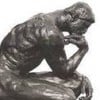The fairest way for non-believers to approach religion...
is perhaps to think of it as an ancient art form. Like all art forms, it springs from human creativity, human wonder, and human dissatisfaction with the mundane. Along with music, fine art, literature and the rest, religion can be a vehicle for what Maslow called self-actualisation. And like the other arts it does not require a rational basis to function.
The choice of what art form to pursue (if any) is a personal one, and should be respected. The arts are not in competition with each other (except for funding!). Each has its own 'rules' or norms which do not apply outside, e.g. the concept of playing in tune has no meaning in painting. The arts live and let live.
Religion might indeed be the oldest art form of all. What adds weight to this is religion's jealousy of the other arts. Religion has a history of banning or restricting artistic expression, mainly because it does not welcome competition in its appeal to people's artistic nature.I would agree, similar to along the lines of writing fiction fantasy, like Aesops Fables or Grimms Fairy Tales.

Both of which are classics, and to be valued as such. There's no need to believe them, either.
Art as an analogy might make sense. When one looks at a painting we will each see different things. Some might see the trees, some might see the forest and not the trees. Some might see the blue flecks of paint beneath the forest and perceive that as a lake or stream. Others might see it was the artists mistake. Etc etc...This is all based on observation and perception. In that sense it might make sense!
This analogy however will fall short because it is missing a few elements...Like that dynamic change in the manifest and the unchanging in the un-manifest that can only be experienced through a direct relationship with both. An internal thing then.I'm not sure about that. I think that the arts can be a vehicle for the highest 'spiritual' experience that humans can go through.
Oh yes for sure, I agree.
Using it as an analogy as a way of understanding a religion is what I was pointing to. Do you mean in a literal sense that religion should be put in art from rather than written form?In an ideal world, I think people would turn to the arts for their 'irrational' fulfilment and to science for their intellectual benefit, and would leave religion well alone. But I don't think that's going to happen any time soon!
in an ideal world people would quite abusing ideas, or abusing religions. if the people that are abusing religion were not doing that, they would find other ways to abuse something for their gains, it is not religion that is the problem, it is the abusers
I can't agree with that. Ideas should be tested to destruction. If they come through unscathed like, for example, Thermodynamics, then they are probably good ideas. If they fall at the first hurdle like Astrology, they should be relegated to the dustbin of history.
Testing an idea does not constitute abuse.there are people that abuse everything, in science, religion, politics, everything.
and that is what gives good things bad reps.
science is great in everything, that is why we have all the nukes, that sure is great for mankind.
gotta go, almost 2am here, going to bedYes. Mostly these are the people driven by power. The rest of us are partly to blame for letting them play their games at our expense.
What a great explanation! I often disagree with you, but usually admire how you explain yourself. Here I both agree with and admire your words.
Paraglider:
To refer to "religion" as an art form, to me, is quite a stretch of the imagination.
Curiosity made me check my dictionary for subtle nuances of meaning for the word "art."
Art:
What religion isn't:
The conscious production or arrangement of sounds, colors, forms, movements, or other elements in a manner that affects the sense of beauty, specifically the production of the beautiful in a graphic or plastic medium.
The study of these activities.
The product of these activities; human works of beauty considered as a group.
High quality of conception or execution, as found in works of beauty; aesthetic value.
What religion is:
Human effort to imitate, supplement, alter, or counteract the work of nature.
Skill that is attained by study, practice, or observation:
arts Artful devices, stratagems, and tricks:
Artful contrivance; cunning.
Paraglider, I can only visualize "religion" as being the "art-of-the-kill."
I have 2000+ yrs of history to back me up and the potential for "it" to be the perpetrator the biblical armageddon.
Qwark
The only difference though is that religion, unlike other forms of art, causes division and bigotry. When is the last time a painting was cited as a reason to persecute gays? I'm not trying to flame, but rather point out a legitimate reason why many non-believers aren't able to see the point-of-view you are espousing. Just food for thought.
In fact, David, I think it is mainly the over-devout who fail to realise that their religion is a human-made art form. That is why they sometimes insist that its internal rules are to be rolled out across society at large.
Haven't seen you for a while. All well, I hope?I have been terribly busy as of late, but yes, all is well. I poke my head in from time to time to check if I have any messages on my Hubs, but I rarely write Hubs or participate in the forums anymore. I hope my schedule will allow me to indulge my creative energy once again in the near future.
That's good. I'll look forward to your new offerings

I doubt Jesus qualifies as an artform.
(although He's been the subject in virtually every known artform)christ is not in virtual every artform.. ...he is only in art forms made in west...and west is not even 20% of world population...if we see in India , christ is minimum as far as art form goes and if we see china same is the case...so 40% art form doesnot have christ and then we have muslim world...so cumilatively christ would be in top 10 list for art form but not number uno...
anyways christ was not meant for art work and neither were other spiritual leaders...Are you including ancient, medieval, renaissance, etc. art?
Jesus himself, no. But the Roman, Orthodox and Anglican churches all relied heavily on the arts to dress up the message and win popular support. And they all tried to ensure art was used for no other purpose. And the literature surrounding his birth is very much in an artistic tradition.
The great paintings and frescos of the Italian Renaissance were largely funded by the church. The church gathered vast sums of money and spent a good deal of it on promoting it's message. The paintings and statues of Michaelangelo, Rafael, Cranach, Tintoretto etc. were produced as illustrations for the illiterate congregations to relate to. They were sumptious because they were intentended to impress (the righteous go to heaven where poverty and hunger are unknown). Rich patrons had artists paint them into these religious scenes, as though hoping that their 'after-life' might somehow imitate art.
The Renaissance church was immensely rich and powerful. Although I'm glad it was generous to artists, I suspect that advertising agencies and media companies would have been the beneficiaries in a modern context.Or national endowments for the arts.
As self-serving as these actions by the Church and the wealthy may have been, at least they did not try to subvert the public's innate standard of what is beautiful or impressive. Today, tax money is used to convince the man on the street that what he finds beautiful isn't, and that he ought to be ashamed about his aesthetic sensibilities.Aya - interesting point. Art jurors are generally made up of class snobs, for lack of a better description. They are usually last to embrace art from the street but when street art becomes popular, they praise it as though they had discovered it themselves.
Yes, and art patrons through the centuries have often been guilty of supporting traditional art while stifling innovation.
That is because art is a hedge against inflation.

I suspect that the advertising agencies and media companies are the main recipients of Churchianity's largess now.
It would be interesting to see the accounts, but I'd guess that most of their money must go on building maintenance, judging by the number of appeals they run. For sure, the church spends more on the church than it gives to the poor.
Transparency in church accounting would be interesting indeed!
On a trip to the Phillipines recently I videoed from a car window as we drove, to show my daughter the poverty we have been spared, it's a dreary video of run-down corrugated iron shacks, then suddenly a palatial Catholic church appeared, white and gleaming with a modern priests villa adjoining, then disappears from frame and back to the hovels..... it showed me the problem immediately.
On the other hand, about every mile or so there were small scruffy 'churches' that were in the community, serving people.
So THE church (inglesia, set apart) is not THE problem, it's what MAN has made it, and I understand and agree with the fury that their opulence and abuse causes.
Before I came to faith, my non believing attitude was to just ignore what I saw, after all, if it does not affect me (and it did not) then let those who corrupt good for their own purposes swill in their own mire.
Better to concentrate on helping those who are in need.
You can do that as a believer or non believer, let God sort out the rest.Yes. The Philippines is a perfect example of church domination at top level. While the local community clergy simply minister to genuine need.
Amanda & Aya - I think it's doubtful if the church would have survived without its appeal through fine art and music. It's not everybody that can be sucked in by verbal mysticism and allegory alone.
Paraglider - I rarely comment on any of the "religious" threads. My personal beliefs are just that - personal. However, I really think that your post is interesting. And I like that it truly espouses tolerance and respect - something we, as a society - have far too little of.
David - I see your point, but I would argue that many forms of art have in fact been very divisive and sparked reactions from disdain to violence. The works of Maplethorpe, for example. Or, too many books to mention. The issue of censorship has divided political factions and communities alike. I would instead say that the main difference may be that while many religions (though certainly not all) encourage faith without question, many art forms encourage questioning, thoughtfulness and debate.What in your opinion is religion; is it an art or a science or both combined in one?
I think my opening post made that fairly clear. Religion has a lot in common with the arts, as it appeals to the sense of wonder.
It has little in common with science, because it provides answers instead of encouraging questions.I don't agree with you. Religion is not necessarily arts. What arts did Moses or Abraham produce? Please
The art is in the story telling. Much of the Bible (and for that matter the Gita and other sacred texts) is simply literature, allegory, poetry, and can be seen in that light.
Tell you what Paraglider - you persuade the believers it is art - I will be more "fair," in my approach to religion.
I had to explain to an extremely religious friend in Italy a few weeks ago why there was a certain cadence to some prayers the priest intoned at his son's christening - he didn't believe me until we found a 600 year old prayer book which was written as musical notes.I'm not so much trying to persuade the believers as trying to explain to non-believers that nuch of the appeal is purely aesthetic, at least until one gives up doubt and gets sucked in!
I can appreciate the aesthetic, but I could live without it if it meant no one got sucked in.

Agreed. Partisanship often follows the irrational leap of faith.
this reminds me of the Psalms which were known to be the songs of David, he was a poet, musician/songwriter. modern scholars now believe they may have been authored by or about David, some of them perhaps written by his sons. they are very poetic, an expressive art form.
I have a friend who was raised in the Roman Catholic church and eventually stopped going in her adult years, but she said sometimes she misses going to the Latin Mass because of it's ritualistic appeal. I've never been to one, so I don't know.I don't agree with you.
It is not its spirit or purpose.
I, not unlike ThoughtfulSpot, don't post on religious threads much, but your topic is very interesting Paraglider.
I can absolutely see the parallels between religion and art. However, the key difference from religious people's perspective is that religion is real history, fact, while most art is fiction and/or requires suspension of belief and reality. Of course, non-believers would not see this distinction and thus approaching religion as you suggest may be a good way to go.
And I agree that religion has a history of censoring others forms of art and expression. This is due to religion's need for self-preservation. And over the centuries its practitioners have taken this to extremes.i am sure we would all like to agree that all roads lead to rome even, when in fact, they do not.
Take for example one God, creator of the heavens and earth. Now picture a person in south america burning incense to a statue of a woman on the soltice night with hopes of bringing up a dead relative to chat with.
Should God be happy with that? I am sure some will say yes to this so i will bring it closer to home. Bobby comes to stay at my house and my dad and mom, bought the house, furnished the house and put the food on the table and all bobby can talk about is his dad and mom and the wonderful things they can do for him.
How is my mom and dad supposed to feel? or react?
So they set bobby straight.
Listen bobby, we bought this house and furnished it -that chair you are on the table holding the food you are about to eat was all a plan of ourselves so that we could sit and have a lovely chat. What does your dad have to do with it?
i will refrain from explaining this any further.I like the concept of religion as an art form. It is about story-telling to a large extent, but it's also about politics and power. The early Christian churches ruled the roost in Europe for long centuries. The story-telling became far less important than the domination of the masses. Religion became a tool to manipulate people.
Most art tries to aproximate reality but at the same time is not true. Religion tries to be true (and fails for the most part) but has nothing to do with reality.
I think we can get too hung up on the idea of truth. I'd say that most art tries to be good, perfect even, but as it is not constrained by facts, truth doesn't come into it. A Beethoven symphony can be great without being true or false. The standards don't apply. Similarly Shakespeare's Richard III isn't devalued at all by the fact that the real Richard didn't behave exactly as in the play.
So, maybe the real Jesus didn't turn water into wine and maybe no shepherds came to his birthplace. The stories are appealing.
The only problem comes when people believe without question.I think we mostly agree. Although, while they can be no doubt art inspired by religion is very great (everything from Palestrina's plain chant to Bob Dylan's songs) if we consider religious scriptures, such as the Bible, just as art are they artistically any good? I think even St. Agustine admited the Bible paled in comparison to the best Greek and Roman poetry. I loved hearing and reading the Bible stories as a kid but would taking away thier historical basis and spiritual meaning zap some of the magic out of them?
The spiritual meaning equates to aesthetic in my model, while the historical basis is in many cases deeply suspect. I agree that there is much in the Bible that falls short in both categories.
umm, in some traditions maybe. Yet when someone says i have had a "spiritual experience", they often mean they felt the presence of a higher being or were commincated to by that being. I think this is different from aesthetic experiences because these experiences must have actually happened, the being was actually there and it was not just imaginary.
How could you tell? The voices heard by schizophrenics and the 'demons' seen by DT sufferers are absolutely real to the recipients and completely hidden from everyone else.
ah, but if they were actually real should we consider them "art"? Could it be that we have to consider religious claims false in order for us to apreciate them purely aesthetically?
More often than not, it's not difficult to consider the claims false!
Related Discussions
- 11
Are video games an art form?
by Stevennix2001 12 years ago
Are video games an art form?Some people say that they do not qualify as art. however, there have been a lot of games in recent years that have managed to tell very thought provoking stories. However, is that enough for it to be deemed art? people used to have the same debate about...
- 13
What are some examples of lost or dying art forms?
by Laura Schneider 11 years ago
What are some examples of lost or dying art forms?
- 7
Do you like the art form of Kerala named' Kathakali '?
by devisree 12 years ago
Do you like the art form of Kerala named' Kathakali '?Kathakali is an art form based on stories of Mahabharata and Ramayana.The beauty of the dress and costumes are really attractive.
- 11
Do you think graffiti is an art form?
by Stacie L 9 years ago
Do you think graffiti is an art form?Some graffiti artists refer to themselves as street artists. They are not involved in a gang and not tagging their territory, but feel they are making a statement.Do you appreciate these wall art designs or not?
- 32
In Christianity, do non believers go to hell?
by cblack 9 years ago
In Christianity, do non believers go to hell?What happens to the people that believe in another religion and another God. If the Christian God is the only true God, then are those people damned?
- 19
Do you consider photography to be an art form?
by Brian L. Powell 12 years ago
Do you consider photography to be an art form?Some people don't. Others do. I would like to hear from you.

























